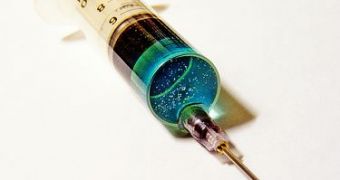Researchers found out that if they added a third anti-viral drug to the standard treatment for the hepatitis C, the cure rate increases significantly, even for the most difficult to treat patients. The research was led by Paul Kwo, MD, of Indiana University School of Medicine and published in the online edition of the journal The Lancer. The research established that adding the drug, almost doubled the effectiveness of the treatment, if given for 48 weeks in a row.
Today, the standard treatment for hepatitis C is effectively working for less than half of patients with Genotype 1 hepatitis C. It consists in associating two drugs, peginterferon alfa-2b and ribavirin for a period of 48 weeks, and it can be difficult because of its side effects. Adding the drug boceprevir to it, increases the cure rate up to 75 percent.
Dr. Kwo, associate professor of medicine at the IU School of Medicine, said that this three-drug combination therapy is significantly better and compared the results to the 38 percent cure rate of the control group. This was a two-year trial, carried out in 67 medical facilities with 520 patients in the US, Canada and Europe.
With this study known as the SPRINT-1 trial, scientists had three objectives. They wanted to know if the addition of boceprevir could help reduce treatment duration, and so they randomly selected some patients to receive the treatment for only 28 weeks. Researchers also tested if a 4 week period with the two-drug combination before adding boceprevir could improve constant virologic response rates. For this experiment, steady levels of the interferon and ribavirin would activate the immune system and reduce virus levels. This would improve the response rates and also prevent the virus from developing a resistance to boceprevir, according to Kwo.
Finally, researchers also tested if they could reduce the anemia side effects by reducing the dose of ribavirin, and still having an effective treatment, e! Science News reports.
Dr Kwo said that “Both 28- and 48-week boceprevir regimens significantly increased sustained virologic response rates – which is the best definition of a cure we have – compared to the 48 week control. The 48-week treatment arm with 4 weeks of peg interferon lead-in and 44 weeks of peg interferon, ribavirin, and boceprevir led to the largest improvement over the control group ever reported. That's very impressive.”
Almost 3.2 million Americans and 170 million people worldwide have the hepatitis C virus, and many don't even know it. As for the genotype 1 hepatitis C, the most difficult to treat, in the US alone there are 70 percent of the infected individuals that have it. This disease is quite tricky because people infected may not have any symptoms for years, and suddenly develop cirrhosis, that can lead to liver cancer and liver transplantation.
Hepatitis C is a disease that spreads through infected blood mostly, and there is no vaccine against it.

 14 DAY TRIAL //
14 DAY TRIAL //